7 books about Bangkok
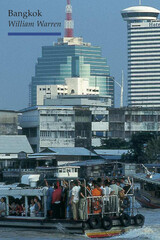
Bangkok
William Warren
Reaktion Books, 2002
William Warren’s Bangkok is an informal portrait of this most vibrant and perplexing of modern cities. Divided into two parts, the first is a selective history, showing how Bangkok has developed over the last 200 years, while the second explores the contemporary face of the city through a series of personal impressions.
The author explains how the charms of Bangkok and its people outweigh the disadvantages of pollution, traffic and stifling heat. He also introduces celebrities, such as the early kings of Thailand’s present dynasty and Anna Leonowens, heroine of The King and I, as well as Jim Thompson, the US-born silk entrepreneur and art collector who mysteriously vanished in the jungles of Malaysia.
Bangkok provides a much needed history of the city, but is also imbued with the warmth of Warren’s love affair with its frenetic way of life.
The author explains how the charms of Bangkok and its people outweigh the disadvantages of pollution, traffic and stifling heat. He also introduces celebrities, such as the early kings of Thailand’s present dynasty and Anna Leonowens, heroine of The King and I, as well as Jim Thompson, the US-born silk entrepreneur and art collector who mysteriously vanished in the jungles of Malaysia.
Bangkok provides a much needed history of the city, but is also imbued with the warmth of Warren’s love affair with its frenetic way of life.
[more]
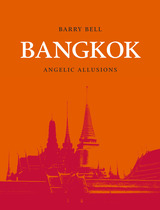
Bangkok
Angelic Illusions
Barry Bell
Reaktion Books, 2003
Cities today, especially those undergoing rapid growth and transformation, seem to defy traditional principles of urbanism and urban analysis. Bangkok, the City of Angels, the capital of Thailand, and an international metaphor of development gone wrong, presents an extreme version of this condition. Indeed, Bangkok, a barely stable setting for its (approximately) twelve million inhabitants, challenges our perceptions of what a city is, or should be. Yet in spite of its chaotic state Bangkok also presents moments of arresting beauty and social intensity. These fragments suggest a potential other city, resting latent within the cacophonous distractions of daily life. The resultant urban mirage is a compelling provocation.
Bangkok: Angelic Allusions uses the tangible artifacts of the city, its topography, streets and monuments, as vehicles for speculating on Bangkok and its central mythologies. Significant in themselves, these physical objects or categories also bring structure to other more perceptual observations and speculations. Ultimately the book links the city’s hectic urban sensibility to its more elusive and mysterious character, the dream of Bangkok which lurks within its physical reality.
Bangkok: Angelic Allusions uses the tangible artifacts of the city, its topography, streets and monuments, as vehicles for speculating on Bangkok and its central mythologies. Significant in themselves, these physical objects or categories also bring structure to other more perceptual observations and speculations. Ultimately the book links the city’s hectic urban sensibility to its more elusive and mysterious character, the dream of Bangkok which lurks within its physical reality.
[more]
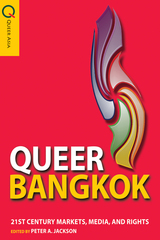
Queer Bangkok
21st Century Markets, Media, and Rights
Edited by Peter A. Jackson
Hong Kong University Press, 2011
The Thai capital Bangkok is the unrivalled centre of the country’s gay, lesbian, and transgender communities. These communities are among the largest in Southeast Asia, and indeed in the world, and have a diversity, social presence, and historical depth that set them apart from the queer cultures of many neighbouring societies. The first years of the twenty-first century have marked a significant transition moment for all of Thailand’s LGBT cultures, with a multidimensional expansion in the geographical extent, media presence, economic importance, political impact, social standing, and cultural relevance of Thai queer communities. This book analyses the roles of the market and media — especially cinema and the Internet — in these transformations, and considers the ambiguous consequences that the growing commodification and mediatization of queer lives have had for LGBT rights in Thailand. A key finding is that in the early twenty-first century processes of global queering are leading to a growing Asianization of Bangkok’s queer cultures. This book traces Bangkok’s emergence as a central focus of an expanding regional network linking gay, lesbian, and transgender communities in Hong Kong, Singapore, Taiwan, Indonesia, the Philippines and other rapidly developing East and Southeast Asian societies.
[more]
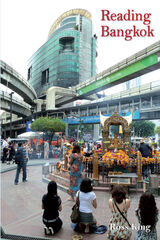
Reading Bangkok
Ross King
National University of Singapore Press, 2011
Reading Bangkok presents stories and meanings derived from the built fabric and spaces of Thailand's capital city. The narrative shifts from King Taksin's mostly forgotten but wondrous Thonburi to the tourist spectacle of Rattanakosin, Dusit and Ratchadamnoen (King Rama V's superficial emulation of an admired, imperialist Europe), Sukhumvit "Road" (consumer land), and the slums that are an integral part of the modern city.
The author structures the book around external intrusions and local resistance. Geographically, this process is seen in movement from centre to periphery (Thonburi, Rattanakosin, Ratchadamnoen, Sukhumvit, Ratchadapisek, Khlong Toei, the universities). Chronologically, the city underwent various forms of colonization: incorporation of the periphery, which in turn colonized Bangkok; the economic colonization of the 19th and 20th centuries; colonization by consumption brought on in large part by globalized tourism; colonization by the "better" ideas of others (typically from the West); and finally colonization by "better" ways of thinking - notably the intrusions of the universities and of popular democracy.
This exceptionally innovative study draws on urban planning and development, history, anthropology, and political economy, and a rich body of empirical data to provide insights into the maze of power relations, inequalities and global influences that is normally hidden from view. Reading Bangkok is that rare thing, a study that genuinely changes the way its subject is seen and understood.
The author structures the book around external intrusions and local resistance. Geographically, this process is seen in movement from centre to periphery (Thonburi, Rattanakosin, Ratchadamnoen, Sukhumvit, Ratchadapisek, Khlong Toei, the universities). Chronologically, the city underwent various forms of colonization: incorporation of the periphery, which in turn colonized Bangkok; the economic colonization of the 19th and 20th centuries; colonization by consumption brought on in large part by globalized tourism; colonization by the "better" ideas of others (typically from the West); and finally colonization by "better" ways of thinking - notably the intrusions of the universities and of popular democracy.
This exceptionally innovative study draws on urban planning and development, history, anthropology, and political economy, and a rich body of empirical data to provide insights into the maze of power relations, inequalities and global influences that is normally hidden from view. Reading Bangkok is that rare thing, a study that genuinely changes the way its subject is seen and understood.
[more]
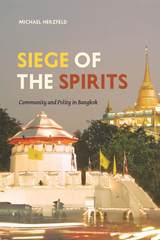
Siege of the Spirits
Community and Polity in Bangkok
Michael Herzfeld
University of Chicago Press, 2016
What happens when three hundred alleged squatters go head-to-head with an enormous city government looking to develop the place where they live? As anthropologist Michael Herzfeld shows in this book, the answer can be surprising. He tells the story of Pom Mahakan, a tiny enclave in the heart of old Bangkok whose residents have resisted authorities’ demands to vacate their homes for a quarter of a century. It’s a story of community versus government, of old versus new, and of political will versus the law.
Herzfeld argues that even though the residents of Pom Mahakan have lost every legal battle the city government has dragged them into, they have won every public relations contest, highlighting their struggle as one against bureaucrats who do not respect the age-old values of Thai/Siamese social and cultural order. Such values include compassion for the poor and an understanding of urban space as deeply embedded in social and ritual relations. In a gripping account of their standoff, Herzfeld—who simultaneously argues for the importance of activism in scholarship—traces the agile political tactics and styles of the community’s leadership, using their struggle to illuminate the larger difficulties, tensions, and unresolved debates that continue to roil Thai society to this day.
Herzfeld argues that even though the residents of Pom Mahakan have lost every legal battle the city government has dragged them into, they have won every public relations contest, highlighting their struggle as one against bureaucrats who do not respect the age-old values of Thai/Siamese social and cultural order. Such values include compassion for the poor and an understanding of urban space as deeply embedded in social and ritual relations. In a gripping account of their standoff, Herzfeld—who simultaneously argues for the importance of activism in scholarship—traces the agile political tactics and styles of the community’s leadership, using their struggle to illuminate the larger difficulties, tensions, and unresolved debates that continue to roil Thai society to this day.
[more]
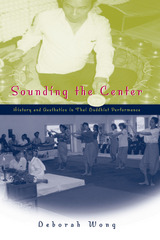
Sounding the Center
History and Aesthetics in Thai Buddhist Performance
Deborah Wong
University of Chicago Press, 2001
Sounding the Center is an in-depth look at the power behind classical music and dance in Bangkok, the capital and sacred center of Buddhist Thailand. Focusing on the ritual honoring teachers of music and dance, Deborah Wong reveals a complex network of connections among kings, teachers, knowledge, and performance that underlies the classical court arts.
Drawing on her extensive fieldwork, Wong lays out the ritual in detail: the way it is enacted, the foods and objects involved, and the people who perform it, emphasizing the way the performers themselves discuss and construct aspects of the ceremony.
Drawing on her extensive fieldwork, Wong lays out the ritual in detail: the way it is enacted, the foods and objects involved, and the people who perform it, emphasizing the way the performers themselves discuss and construct aspects of the ceremony.
[more]
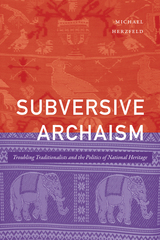
Subversive Archaism
Troubling Traditionalists and the Politics of National Heritage
Michael Herzfeld
Duke University Press, 2021
In Subversive Archaism, Michael Herzfeld explores how individuals and communities living at the margins of the modern nation-state use nationalist discourses of tradition to challenge state authority under both democratic and authoritarian governments. Through close attention to the claims and experiences of mountain shepherds in Greece and urban slum dwellers in Thailand, Herzfeld shows how these subversive archaists draw on national histories and past polities to claim legitimacy for their defiance of bureaucratic authority. Although vilified by government authorities as remote, primitive, or dangerous—often as preemptive justification for violent repression—these groups are not revolutionaries and do not reject national identity, but they do question the equation of state and nation. Herzfeld explores the political strengths and vulnerabilities of their deployment of heritage and the weaknesses they expose in the bureaucratic and ethnonational state in an era of accelerated globalization.
[more]
READERS
Browse our collection.
PUBLISHERS
See BiblioVault's publisher services.
STUDENT SERVICES
Files for college accessibility offices.
UChicago Accessibility Resources
home | accessibility | search | about | contact us
BiblioVault ® 2001 - 2024
The University of Chicago Press









